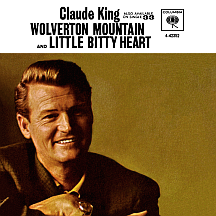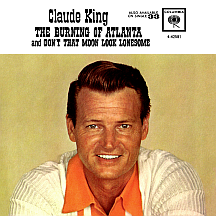CLAUDE KING
Wolverton Mountain
Clifton Clowers was as country as they come, a mountain man born in 1891 who lived north of Conway, Arkansas on Woolverton Mountain. He was immortalized in song when his nephew, Merle Kilgore, stayed at his home one summer, so bored by the isolation that he wrote "Wolverton Mountain" (as it was eventually respelled), about Clowers and his 'pretty young daughter' (he actually had three) protected from love-starved city slickers by the mountain's supposed inaccessibility and Clifton's reputation as being '...mighty handy with a gun and a knife,' a mean ol' coot it would seem (though in reality those skills were used for shooting game and whittling). 'The bears and the birds tell Clifton Clowers if a stranger should enter there' was one way to keep his daughter(s) safe from would-be suitors, one of whom singer Claude King claimed to be.
Clowers was 32 years old at the time of King's birth in Keithville, Louisiana, near the much larger city of Shreveport. His main interests as a child were sports and music and though he began playing guitar around age 12, it was a career as a baseball player he sought. World War II put both on hold as Claude served in the U.S. Navy between 1942 and '45. After the war he played in a hillbilly band called The Rainbow Boys with bassist Tillman Franks and fiddler Buddy Attaway. King's debut disc came in the wake of Roswell, New Mexico's alleged UFO sighting in 1947; "Flying Saucers," on the President label, was credited to Buddy and Claude. The trio made records as Tillman Franks and the Rainbow Boys from 1949 into the early '50s; Webb Pierce sang on "Drifting Texas Sand" and other Pacemaker label 78s by the Boys. King sang lead on some of the group's Gotham label recordings ("Beer and Pinballs") while another future C&W star, Faron Young, provided the lead vocal for "Hot Rod-Shotgun Boogie No. 2," another single on Gotham credited to Franks and the group.
Franks became Webb Pierce's manager shortly before the singer's 1952 signing with Decca Records resulted in a 20 year run as one of country music's hottest stars. King and Attaway were hired as regulars on the Louisiana Hayride radio show (broadcast on Shreveport's 50,000-watt KWKH radio) backing Pierce, Young and other stars, as well as up-and-coming singers; Pierce and Kitty Wells recorded some of King's compositions. He made his first solo records (as Claude King and his Hillbilly Ramblers) for the Los Angeles-based Specialty label in '52 and '53 beginning with "She Knows Why." The whimsical "Got the World by the Tail," his third of four Specialty singles, would be remade a decade later, though these early efforts bore little resemblance to the songs that made King a common fixture in '60s country culture.
King struck up a friendship with Johnny Horton through appearances on Lousiana Hayride, which had expanded to television by the mid-'50s when Horton's star was on the rise. Franks had been managing Horton's career for a time and began representing King as well. "Run Baby Run," a rocking tune written and recorded by Claude in 1957 for the small Dee Jay label, failed to connect at country or pop radio. Frustrated by his lack of success while so many of those around him had become top stars, King chose to stop making music and took a steady job in construction, though he continued writing songs in his spare time. He and Horton had become close friends due largely to their shared love of the outdoors, often getting together to go fishing or hunting; Johnny eventually convinced him to give his singing career another try.
By the time the 38-year-old Claude King signed with Columbia Records in 1961, his friend Johnny Horton (one of Columbia's top recording artists) had died in an automobile accident. To King's amazement, he scored a hit with his very first release for the label, "Big River, Big Man." Written by Michael Phillips and George Watson, it sounded very much like Horton in style and subject matter, a top ten country hit that summer that also crossed over to the pop charts. "The Comancheros," a Tillman Franks song inspired by, but not used in, the film of the same title directed by Michael Curtiz and starring John Wayne, returned King to the country top ten and the pop charts in early 1962.
Then came the silly smash forever associated with Claude King; "Wolverton Mountain" spent all of July and August at number one on the country charts, a summertime million seller that also reached the pop top ten. When word got out that the song's "villain" was a real person, life on the mountain got more complicated for Clifton Clowers. People came from far and wide to catch a glimpse of this so-called mean old man; foolhardy young men made the trek up the mountain to see if he really had a daughter whose '...tender lips are sweeter than honey.' Clowers, in his seventies at the time (he lived to the ripe age of 102), welcomed the attention. The song's extreme popularity spawned an "answer" by Jo Ann Campbell, "I'm the Girl From Wolverton Mountain" (alternately titled "(I'm the Girl On) Wolverton Mountain"), a top 40 pop hit in September that also made the country top 30 (though Jo Ann wasn't a country singer, her rural twang a put-on). Even more oddball novelty variations emerged, the best-known a thing called "Tijuana Border" by the satirically-named El Clod, an H.B. Barnum production with singer Marty Cooper affecting a fake Mexican accent ('...her tender lips are hotter than chili!').
"The Burning of Atlanta," a Hortonesque historial number written by Chuck Taylor, was Claude's fourth straight top ten country hit in the fall of '62. "I've Got the World by the Tail" was successfully revived (adding a word to the title), followed by "Sheepskin Valley," "Building a Bridge" and "Hey Lucille!," all hits in 1963. His biggest of '64, "Sam Hill" (penned by Tommy Collins), covered familiar territory (a girl on a hill, a veiled reference to a real-life person and a well-worn phrase, 'What in the Sam Hill's goin' on?'). The King-Kilgore song "Tiger Woman" utilized yet another popular slang phrase ('...you're still pussy-footin' around') and landed him back in the country top ten; many hits followed over the course of the decade.
In 1969, King paid tribute to his revered friend with an album, I Remember Johnny Horton, and hit the country top ten with "All For the Love of a Girl," a song Johnny had recorded for Mercury Records in 1954. Claude remained with Columbia Records until 1972 (a 1970 cover of Bob Dylan's "I'll Be Your Baby Tonight" among his hits during that time), then made records for Cinnamon, Gusto and several other small labels. He made a brief foray into acting, appearing in a pair of low budget pictures, Swamp Girl (which also featured country music star Ferlin Husky) in 1971 and The Year of the Yahoo! (a political mish-mash) in '72. In 1977 he appeared on the country charts one last time with the True Records single "Country Dan." In the 1980s, Claude King retired and settled in Shreveport with his wife and three sons.



